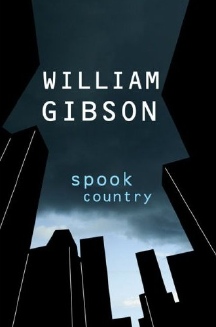 |
 William Gibson
William Gibson
Spook Country
Reviewed by: Rick Kleffel © 2007
G. P. Putnam's Sons / Penguin Putnam
US First Edition Hardcover
ISBN 978-0-399-15430-0
371 Pages; $25.95
Publication Date: 08-07-2007
Date Reviewed: 08-26-2007
Index:
Science Fiction
General Fiction
Mystery
We like to think we know the world around us, after a fashion. One event triggers another, we respond or do not respond as suits our perception. But that clarity, that transparency is an illusion. There's more that we can see, more than our minds can possibly hold, unfolding around us. William Gibson's 'Spook Country' goes a long way towards giving us the opacity that we deserve with a smile and a shrug. No, as it happens, we do not know the world around us. But occasionally we get handed enough pieces of the puzzle to pout together at least part of the picture.
In a series of seemingly disconnected blackout-style scenes, Gibson introduces a diverse group of characters. Hollis Henry is a journalist working for a shadowy Wired-wannabe clone, Tito is an expatriate Cuban twenty-something smuggler, and Milgrim is a prescription-drug junkie under the dubious supervision of an obsessive CIA-or-worse spook named Brown. Hollis has been assigned to investigate something called "Locative art", an overlay of VR on real locations. Tito and his family are in the process of doing something with an iPod. Probably something illegal. Milgrim and Brown are watching somebody, and everyone is unknowingly circling around the same drain. Sooner or laterkl they'll all wind up in the same whirlpool, headed down.
Gibson has a grand time in his latest novel, infusing it with an almost whimsical sense of humor and absurdity. His prose is indeed as opaque as the lives he reveals, poetic and yet with startlingly direct observations that are often very funny. There's a sense of understatement that permeates every sentence, a feeling that Gibson is throttling the information overload. The focus is always tight, and the humor that enlivens the prose is as dry as the dust blowing down the deserted streets of Los Angeles in a Santa Ana monsoon. Chapter by short chapter, reading 'Spook Country' is like reading someone else's postcards. The pieces are picture-perfect, while the big picture remains just beyond ken.
To be sure, there are lots of great specifics in 'Spook Country;' that give the novel the feel of a science fiction novel without seeming to belong to the genre. Gibson's explication of "locative art" is superb, and his visions of government investigations in a post-9/11 era are — not surprisingly — spooky. Gibson has always given his high-tech visions the feel if not the substance of the supernatural. He knows that our current level of technology has progressed to the point where it is indeed indistinguishable from magic, and that knowledge informs his writing. As with 'Pattern Recognition', he manages to make the recent past seem like a surreal science future, because, in fact, it is a surreal science fiction future, especially to readers of science fiction. We're all aware of the dystopian forces at work around us, but Gibson's gift is to make them seem unfamiliar and vaguely threatening. When they're not either bumbling and mumbling.
Gibson's in no hurry to reveal the hole in reality around which all these losers, users and cruisers are circling, but there's enough novelty in each segment that the plot never seems to drag. And he's an ace mystery writer, tantalizing the reader with possibilities. He's smart enough to let the reader do just enough work so that the "Aha!" moments retain their power and the reading experience is extremely enjoyable. Sure, there's always something happening at the edges of the picture that seems to be in soft focus. That's what makes the novels not just readable, but re-readable. There's not a single, simple solution to this puzzle, though there is most certainly a fantastically enjoyable resolution.
Fans of Gibson's science fiction will find that 'Spook Country' seems like SF even though every genre trapping has been stripped away. Oh, there's a nice bit of techno-kit, but it's strictly within the realm of the possible. You might think so, at least, when you read 'Spook Country'. Once you're outside of the novel regarding your own life again, you might think differently. The power of 'Spook Country' is that it works to let the reader accommodate opposing viewpoints, to allow the magical and the technological to mingle once again. To make it clear that the world is not clear, and that the most opaque aspects of government and culture should damn well be transparent. To see the emperor's invisible new clothes, the full regalia and splendor of subterfuge — and get a good laugh.
|
 |
